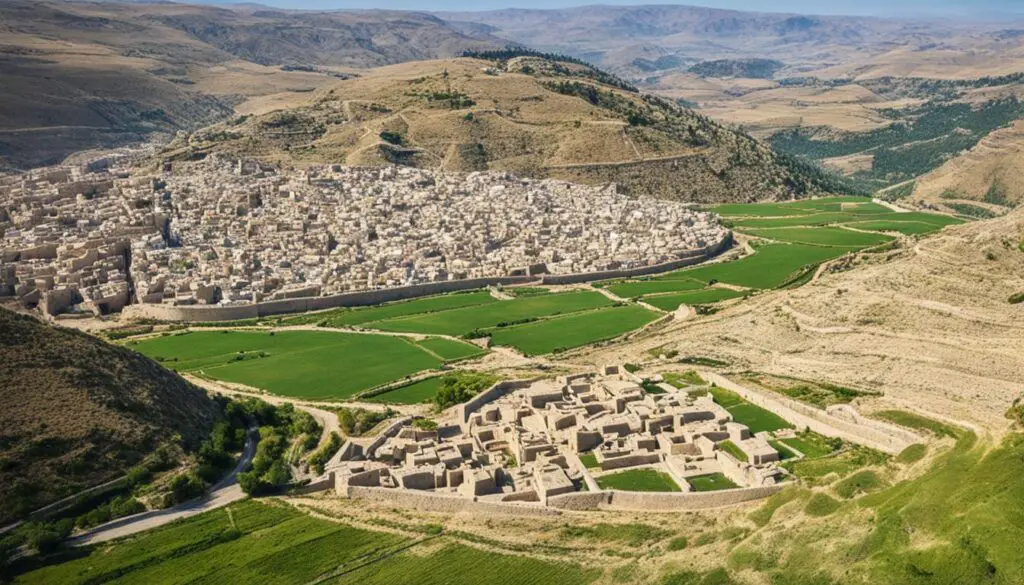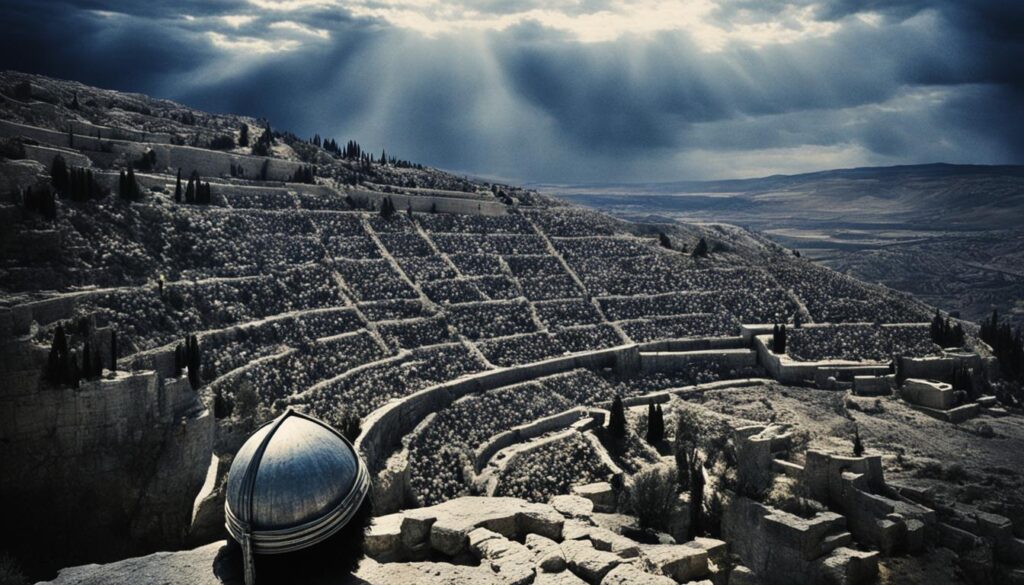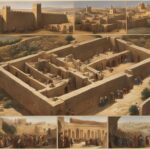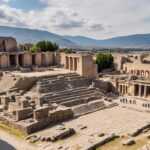Gibeah, a name mentioned in the Bible, holds significant historical and spiritual meaning. Exploring the references to Gibeah in the Old Testament allows for a deeper understanding of its significance and lessons it brings. Within this biblical context, the name “Gibeah” refers to three distinct locations, with the most well-known being a city within the tribal lands of Benjamin, near Jerusalem.
One of the most infamous stories associated with this specific Gibeah is recorded in Judges 19-21. It tells the tale of the heinous acts committed in Gibeah, which ultimately led to God’s judgment and serves as a cautionary reminder of the consequences of corruption and the need for redemption.
Key Takeaways:
- Gibeah is mentioned in the Old Testament and carries historical and spiritual significance.
- The most well-known Gibeah is located in the tribal lands of Benjamin, near Jerusalem.
- Gibeah gained notoriety due to the sinful acts recorded in Judges 19-21.
- The events in Gibeah highlight the consequences of corruption and the need for redemption.
- Studying the biblical references to Gibeah provides insights into its historical context and theological themes.
The Historical Significance of Gibeah
The historical significance of Gibeah lies in its association with the tribe of Benjamin and the events recorded in the book of Judges. Gibeah is mentioned in several passages of the Old Testament, including Judges 19-21.
In biblical Gibeah, the moral decay and lawlessness among the residents and the Israelites at that time is highlighted. The incident involving the Levite and his concubine showcases the grave consequences of corruption and rebellion against God’s commands.
“There was no one in Gibeah who welcomed me into their homes to stay overnight. This reflects the moral decay and lack of hospitality that had taken hold of the city.” – Levite (Judges 19:15)
The destruction and punishment that followed the events in Gibeah served as a grave warning, reminding the Israelites of the importance of righteousness and the need to live in obedience to God’s laws.
The historical context of Gibeah provides valuable insights into the moral climate of that period and highlights the consequences of unchecked sin. The story of Gibeah offers a powerful lesson about the importance of upholding righteousness and serves as a reminder of the need for repentance and redemption.
Key points:
- Gibeah is associated with the tribe of Benjamin and is mentioned in the book of Judges.
- The incident involving the Levite and his concubine highlights moral decay and rebellion against God’s commands.
- God’s destructive judgment on Gibeah serves as a warning of the consequences of corruption.
- Gibeah’s historical context sheds light on the moral climate of the time and emphasizes the importance of righteousness and obedience.
The Geographical Location of Gibeah
Gibeah, a significant location in the biblical narrative, is situated in the tribal lands of Benjamin, approximately three to five miles north of ancient Jerusalem. It holds particular importance in the Old Testament, with several events and stories centered around this region.
A popular belief among scholars today is that the location referred to as Tell el-Ful corresponds to the biblical Gibeah. Tell el-Ful is an archaeological site located on the northern outskirts of Jerusalem, standing at an elevation of 2,754 feet above sea level.

This image showcases the geographical area surrounding Gibeah, providing a visual representation of its proximity to Jerusalem and the surrounding terrain.
Archaeological Discoveries in Gibeah
Archaeological excavations at Tell el-Ful, believed to be the biblical Gibeah, have yielded fascinating findings that offer valuable insights into the historical and cultural significance of the region. These discoveries shed light on the material culture and daily life in Gibeah during the ancient biblical era.
Among the remarkable archaeological discoveries at Gibeah are:
- Ancient Structures: The excavations have revealed the remains of ancient structures that provide clues about the architectural style and layout of the city during biblical times. These structures include walls, houses, and possibly religious buildings.
- Pottery Fragments: Numerous pottery fragments have been unearthed, showcasing the craftsmanship and artistic traditions of the people who lived in Gibeah. These pottery pieces provide insight into their daily activities, culinary practices, and trade patterns.
- Artifacts: Various artifacts dating back to the time period of the biblical events have been discovered, including weapons, tools, jewelry, and household items. These artifacts help reconstruct the material culture and technological advancements of the ancient inhabitants of Gibeah.
These archaeological findings not only contribute to our understanding of ancient Gibeah but also provide a glimpse into the broader historical context of the region, offering researchers and historians a wealth of information to study and analyze.
Theological Themes in Gibeah
The events in Gibeah, particularly the Levite’s actions and the resulting civil war, carry theological significance and offer valuable spiritual lessons. These events serve as a reminder of the consequences that arise from abandoning God’s commands, highlighting the need for repentance and redemption. The story of Gibeah unveils the detrimental effects of unchecked sin and emphasizes the importance of seeking righteousness.
The biblical account of Gibeah showcases the dangers of moral decay and rebellion against God’s principles. It serves as a cautionary narrative, urging individuals to reflect on their actions and make choices in alignment with God’s will. The story of Gibeah presents an opportunity for self-examination, prompting believers to evaluate their own lives and strive for righteousness.
“Do not be deceived: God is not mocked, for whatever one sows, that will he also reap.” – Galatians 6:7
The events in Gibeah provide profound spiritual lessons. They underscore the importance of adhering to God’s commandments, as the consequences of disobedience often result in disastrous outcomes. Through this biblical narrative, individuals are reminded of the mercy and redemption available to them through repentance and the sacrifice of Jesus Christ.

Key Biblical Events in Gibeah
The biblical account of Gibeah encompasses several key events that shed light on the moral degradation and consequences of rebellion against God’s commands. The incident involving the Levite and his concubine, as recorded in Judges 19-21, stands as the most significant event associated with Gibeah during that time.
“There was no one to rescue her.” – Judges 19:28
The story revolves around a tragic series of events that unfolded in Gibeah, revealing the extent of corruption and violence prevalent in the city. The Levite’s concubine faced unimaginable cruelty, resulting in her death and the subsequent civil war that ensued.
This particular event serves as a grim reminder that unchecked sin and moral decay have dire consequences. It highlights the urgent need for righteousness and the call for individuals and communities to adhere to God’s commands. The story of Gibeah stands as a cautionary tale, urging us to actively pursue justice and uphold the principles of righteousness.
Biblical Events in Gibeah:
- Levite’s concubine subjected to abuse and violence
- The Levite’s response and subsequent journey
- Discovering shelter in Gibeah
- An act of heinous sin and moral corruption
- The Levite’s fateful decision
- Consequences of the sinful act
- Civil war and punishment of the tribe of Benjamin
The story of Gibeah serves as a powerful reminder of the importance of righteousness, justice, and adherence to God’s commands. It stands as an enduring testament to the consequences of unchecked sin and serves as a call to repentance, redemption, and attaining a higher standard of morality.

Cultural and Religious Practices in Gibeah
The cultural and religious practices in Gibeah were heavily influenced by the broader Israelite culture during the biblical period. The inhabitants of Gibeah, like other Israelites, engaged in various customs and traditions that formed an integral part of their daily lives.
One of the significant cultural practices in Gibeah and the surrounding region was the worship at local shrines or high places. These sacred sites were often located on hilltops or elevated areas, where people would gather to offer sacrifices and seek spiritual guidance. These religious gatherings provided opportunities for communal worship and the celebration of festivals.
In addition to shrine worship, the people of Gibeah would have actively participated in religious festivals and rituals. These festivals, such as Passover, Pentecost, and the Feast of Tabernacles, played a crucial role in the religious life of the Israelites. They involved rituals, sacrifices, and communal feasting, serving as occasions for both religious observance and social bonding.
The agricultural practices in Gibeah would have revolved around the cultivation of crops that were suitable for the region. The geographical location of Gibeah, with its proximity to Jerusalem and its high elevation, likely influenced the types of crops grown. The people of Gibeah would have been engaged in activities such as farming, herding livestock, and tending to vineyards and orchards.
However, it is important to note that the events recorded in the biblical account of Gibeah highlight the deviance from these cultural and religious practices. The sin and violence that occurred in Gibeah went against the teachings and commandments of God, resulting in severe consequences and judgment.
“And the men of Gibeah rose against me and surrounded the house against me by night. They intended to kill me, but instead they violated my concubine, and she died.”
– The Levite recounting the sinful acts in Gibeah (Judges 19:25)
These events in Gibeah serve as a cautionary tale, emphasizing the importance of upholding moral values and adhering to God’s commands. They remind us of the consequences that arise from deviating from the prescribed religious practices and engaging in sinful behavior.
The image above illustrates the significance of cultural practices in Gibeah and the impact they had on the lives of its inhabitants during biblical times.
Prophetic and Eschatological Significance of Gibeah
Although direct prophetic or eschatological references to Gibeah may not exist in the biblical text, the story and the judgment that befell the city hold symbolic implications with far-reaching eschatological implications. Gibeah serves as a poignant warning, showcasing the dire consequences of wickedness and rebellion against God’s commandments.
Just as judgment befell Gibeah for its sinful actions, it stands as a sobering reminder that God’s judgment will come upon those who persist in their sinful ways. The events in Gibeah foreshadow the ultimate judgment that will befall all of humanity, underscoring the urgency for repentance and reconciliation with God.
“Woe to those who call evil good and good evil, who put darkness for light and light for darkness, who put bitter for sweet and sweet for bitter!” – Isaiah 5:20
In the eschatological context, the story of Gibeah serves as a powerful allegory, highlighting the need for righteousness and the consequences of persistent iniquity. It serves as a call to examine our own lives, turn away from evil, and seek God’s righteousness.
The Role of Gibeah in the Eschatological Narrative
While Gibeah itself may not be explicitly mentioned, the themes and lessons from its story find resonance in the overall prophetic and eschatological teachings of Scripture. The pervasiveness of sin, the need for redemption, and the ultimate judgment and restoration are prominent themes that weave through the fabric of eschatological teachings.
The depiction of Gibeah’s tragic fate serves as a microcosm of the world’s rebellion against God and the consequences that await those who persist in sin. It underscores the eschatological truth that God’s justice will prevail, and every individual will be held accountable for their actions.
Turning from Gibeah’s Example
Gibeah stands as a sobering reminder that wickedness and rebellion against God’s commandments lead to destruction and judgment. It calls believers to examine their own lives, repent of their sins, and earnestly seek a path of righteousness.
The story of Gibeah compels us to prioritize obedience to God’s word, to stand against injustice, and to strive for righteousness in our daily lives. Through genuine repentance and faith in Jesus Christ, believers can find redemption and be spared from the judgment that befalls the wicked.
As we journey through life, the lessons from Gibeah serve as a compass, guiding us toward a life of holiness and alignment with God’s will. Let us learn from the tragic events of Gibeah and strive to live as faithful followers of Christ, obedient to His teachings and committed to sharing His love with the world.

The Redemption Message in Gibeah
Despite the darkness and depravity that permeates the story of Gibeah, there is a powerful message of redemption woven within its narrative. This biblical account showcases the contrast between the sinful actions of the characters and the redemptive nature of God’s grace.
“For I will forgive their iniquity, and I will remember their sin no more.” – Jeremiah 31:34
In the face of human wickedness and moral decay, the story of Gibeah serves as a reminder that God offers salvation and forgiveness to all who repent and turn to Him. It is a testament to the transformative power of faith and the limitless depths of God’s love and grace.
The tale of Gibeah demonstrates that no matter how lost or broken humanity may be, there is always hope for redemption. Just as the characters in this story had the opportunity to experience God’s forgiveness and grace, so too can we find solace and restoration through faith in Jesus Christ.
“Therefore, if anyone is in Christ, he is a new creation; old things have passed away; behold, all things have become new.” – 2 Corinthians 5:17
By embracing the redemption message of Gibeah, we are reminded of the enduring power of God’s love to rescue and transform lives. It is in Him that we find true healing, restoration, and the promise of eternal redemption.

Key Themes of Redemption in Gibeah
| Theme | Scriptural Reference |
|---|---|
| The offer of forgiveness | Jeremiah 31:34 |
| The transformative power of faith | 2 Corinthians 5:17 |
| The limitless depths of God’s love and grace | Ephesians 2:4-5 |
| The promise of eternal redemption | Hebrews 9:12 |
Lessons from Gibeah for Today
The biblical account of Gibeah holds valuable lessons for believers today. It serves as a reminder of the consequences of unchecked sin, the importance of living in accordance with God’s commands, and the need for repentance and redemption.
“The story of Gibeah highlights the consequences of unchecked sin, the importance of living in accordance with God’s commands, and the need for repentance and redemption.”
Gibeah, situated in the tribal lands of Benjamin, was a city plagued by moral decay and lawlessness. The sinful acts committed in Gibeah led to God’s judgment, demonstrating the vital importance of righteousness and justice in the lives of God’s people. By examining the events in Gibeah, we can gain insights that have significant relevance to our lives today.
One crucial lesson we can learn from Gibeah is the destructive power of sin. The events in Gibeah serve as a warning against the consequences of unchecked sin and the devastating impact it can have on individuals and communities. It reminds us of the need to guard our hearts and prioritize righteous living.
The story also emphasizes the importance of living in accordance with God’s commands. The inhabitants of Gibeah abandoned God’s law, leading to moral decay and the deterioration of their society. The lessons from Gibeah urge us to strive for obedience to God’s Word and uphold His standards in all areas of our lives.
Lastly, Gibeah highlights the need for repentance and redemption. Despite the darkness portrayed in the story, the message of redemption shines through. It reminds us that even in the face of human wickedness, God offers salvation and forgiveness to those who turn to Him. Gibeah serves as a call to repentance and a reassurance of God’s grace.
As we reflect on the lessons from Gibeah, let us strive to live lives of righteousness, obedience, and repentance. May we learn from the mistakes of the past and align our lives with God’s commands, trusting in His redeeming love and grace.
Conclusion
The account of Gibeah in the Bible provides a sobering glimpse into a dark chapter in Israel’s history, where moral decay and rebellion against God’s commands had severe consequences. It serves as a stark reminder of God’s judgment on sin and the urgent need for redemption.
Gibeah’s harrowing story emphasizes the importance of righteousness and the devastating consequences of unchecked wickedness. The events in Gibeah serve as a cautionary tale, calling believers to reevaluate their own lives and ensure their actions align with God’s commands.
Through studying Gibeah’s narrative, believers gain valuable insights into the significance of living a righteous life and the dire consequences of moral decay. Furthermore, the story points us to the ultimate solution for redemption: faith in Jesus Christ. It is through Him that we find forgiveness, salvation, and the opportunity to live in obedience to God’s commands.







